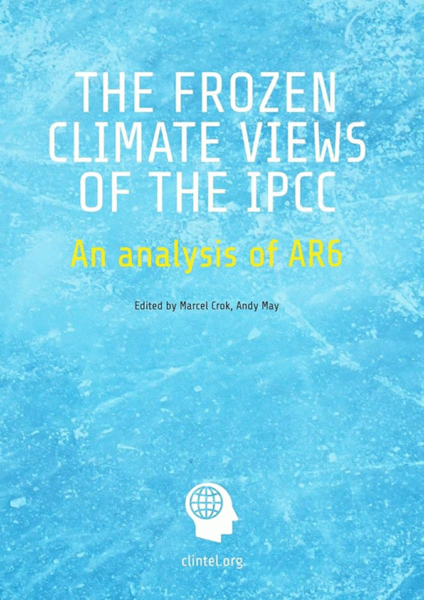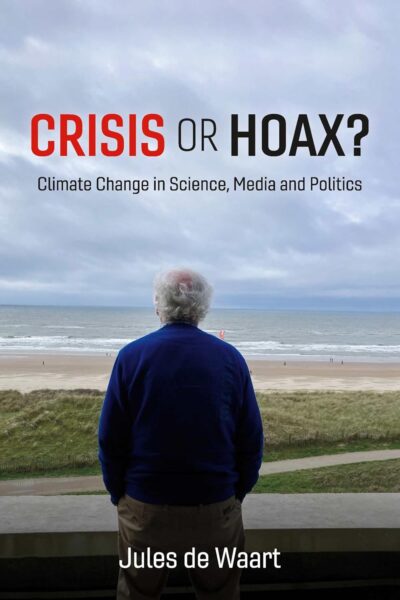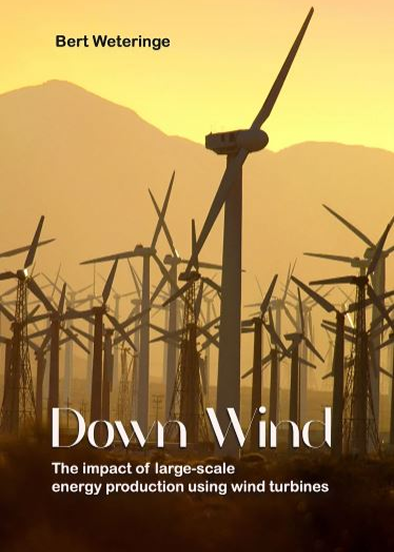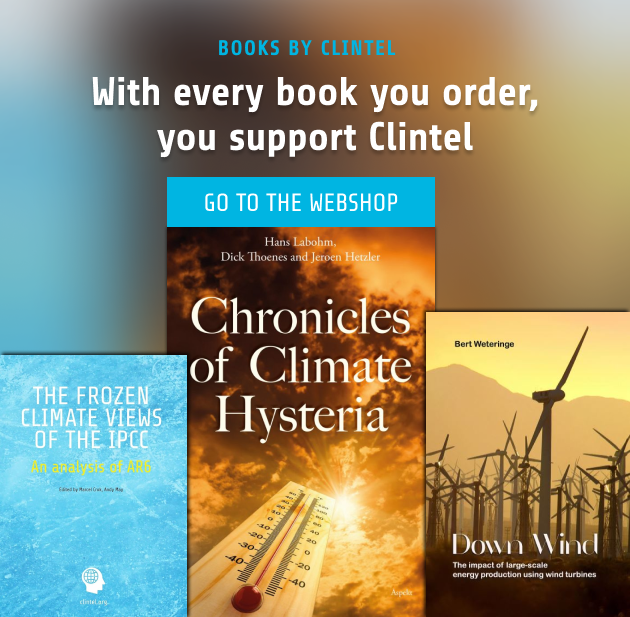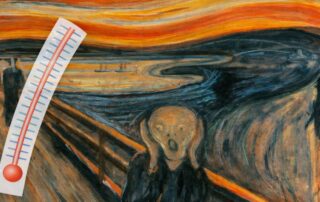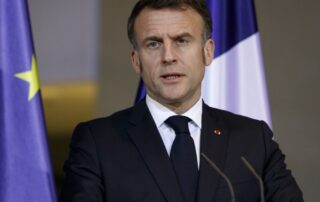Crisis or hoax?, a new book by former Dutch parliamentarian
“A magisterial book” wrote Prof. Guus Berkhout in praise of my book Crisis or Hoax? I am an earth scientist by training and a former politician and his early support meant a great deal to me. As a “real” climate scientist – a member of the Royal Dutch Academy of Arts and Sciences and co-founder of CLINTEL – his endorsement added a much needed weight to my work. So did the endorsement of Jan Pronk, not a climate skeptic, but invaluable for his support. He was a former minister for the environment in the Netherlands and the chairman of UN conferences in The Hague and Bonn, and expressed his hope “that this book will provoke a serious discussion”.
I studied physical geography and climatology at the University of Amsterdam, where I earned my PhD. My early career took me to various African countries as an exploration geologist. Later I returned to the Netherlands to work at the Ministry of Health and Environmental Policy. Politics eventually drew me in. I served for many years in the Provincial States of North Holland and in the Dutch National Parliament. After leaving Parliament I worked as an interim manager on projects related to infrastructure and the environment.
In retirement, I pursued further studies in political science – earning a Master’s degree – and in the philosophy of science. This broadened my view of what constitutes real science, pseudo-science and “cargo cult science” – a term introduced by Nobel Laureate Richard Feynman to denote work that outwardly resembles science in form but lacks a genuine commitment to truth. I also rediscovered the earth sciences and came to appreciate just how central they are to any meaningful understanding of climate change.
For an earth scientist, the IPCC consensus that climate change is dominantly caused by CO2 is close to a myth, a conviction close to a religion based on very little proof. Climate scientists rarely speak about the Earth’s climate, about the main climate zones – from tropical to polar – and the 30 subzones as distinguished by climatologists. Temperature differences on Earth can be very large, sometimes close to a hundred degrees, but these differences occur under global CO2 concentrations that are virtually the same all over the globe; there is no correlation, CO2 cannot explain the spatial differences in temperature on Earth. Nor can it explain the historical correlations. Geologic evidence show that for the last 800.000 years, including our own Modern Warm Period, differences in CO2 concentrations followed the global temperatures. First, temperatures rose due to natural factors; subsequently, CO2 concentrations increased – primarily as a result of emissions from the oceans. Again, CO2 could not have been a dominant cause.
Doing my research for Crisis or Hoax?, I became more and more convinced that climate science is not settled. That the proportions between natural and human causes are still barely understood, that human causes are much broader than greenhouse gases alone.
Pile of literature
Shocking for me was to see that climate scientists publish a lot – more than 120.000 new peer reviewed articles in the last 10 years – but seem to read very little. They do read some of the titles, sometimes the abstracts as well, but virtually never the complete articles. This explains why a paper by Mark Lynas et all in 2021 with the title “Greater than 99 % consensus on human caused climate change in the peer reviewed literature” was welcomed by the IPCC , when in fact it was a total falsification of the IPCC consensus. Not convinced? Look it up with Google Scholar, easy and free. Lynas gives the results of a random sampling of 3000 abstracts in his table 3. Only 19 out of 3000 voted for his Category 1: “Explicitly stating that humans are the primary cause of recent global warming”. That is much less than 1 %! The rest voted for an explicit or implicit statement that human are causing global warming, without any quantification. But that is an open door! Virtually any skeptical climate scientist can live with that. But the real consensus in the peer reviewed literature about a primary or dominant human influence was not 99% but 1%! And nobody seemed to care.
There is more. In the two latest reports of the IPCC (AR5 and AR6) only 6 % of its authors gave a very high confidence (9 out of 10) to most of the statements of their own writing group. Without any reason given, the last IPCC report raised the high confidence (8 out of 10) from 36% to 56%. Still very low, normally academic papers require a much higher confidence. Even more startling was the fact that according to the very influential AR5 (2013) a majority of the authors gave a medium to low confidence to the statements in the report that was supposed to be the scientific background for the Paris Agreement of 2015. And again, no one seemed to care.
Forced consensus
More and more I came to believe that the IPCC consensus was a forced consensus with many scientists privately struggling with its basic assumptions. But forced by whom? Why would so many scientists – including some very good ones – along with nearly all of the world’s governments (some quite reasonable), major institutions, virtually all mainstream media, the UN and the Pope, support a questionable theory as if it were absolute truth? Why is any scientific counter-evidence rejected, skeptical literature ignored and open debate so often suppressed? Why do they close their eyes to the damning effects of their politics on the world’s economy? Blindly committing to a Net Zero scenario that will cost trillions – all to combat a crisis that most likely will never materialize?
Asking these questions – however legitimate they may be- is not the same as answering them. Far from it. Any serious answer would require a strong background in fields that are not my own; psychiatry, mass psychology, sociology and even criminology. I set it aside for the moment, hoping for solutions to emerge over time.
But perhaps a direct answer is not immediately necessary. I believe that a part of the answer– though certainly not complete – lies in a global tendency to avoid risks at all costs. This mindset is known as the “precautionary principle”. Under the precautionary principle it becomes possible to demand enormous sums of money to address dangers that are unpredictable, unproven and often unlikely, without having to provide solid justification or conduct a cost-benefit analysis.
The result? Irreversible decisions and binding treaties that cannot easily be undone, costing trillions. A return to the pre-1992 “no-regret principle” would give policymakers the flexibility to revisit earlier decisions and evaluate them through the lens of the most recent knowledge and to costs/benefit analyses – allowing us to protect the environment without destroying the economy. The book gives a list of recommendations and “solutions” to do just that.
In short: Crisis or Hoax? is a much needed invitation to rethink climate science, media narratives and political agendas. It provides a wealth of peer reviewed sources and offers practical recommendations for scientists, media and policymakers alike.
The book and the eBook can be ordered via Bookbaby, Amazon, Kobo and most booksellers in the world.
more news
Guardian Claims We’re Still Only Approaching the Climate Point of No Return
The Guardian claims the world is edging toward a climate “point of no return,” where unstoppable warming will lock Earth into a catastrophic “hothouse” future. Yet the geological record tells a very different story. Past periods of far higher temperatures and CO₂ levels did not end life or civilization’s prospects — they supported abundance and evolutionary expansion.
The EV experiment has become a bloodbath — $140 billion wasted — more to come
The electric vehicle push was supposed to reshape the auto industry and accelerate the energy transition. Instead, mounting losses and collapsing share prices are raising serious questions about whether governments and manufacturers misread the market. What began as a bold industrial gamble is now looking, to some critics, like one of the most expensive policy experiments in recent automotive history.
Sacré bleu! Macron blames renewables for Spain’s blackouts, France drops renewables targets, expands nuclear
Europe’s energy debate is shifting. After Spain’s major blackout, even long-time advocates of aggressive renewable targets are questioning whether power systems can rely so heavily on wind and solar without sacrificing stability.
